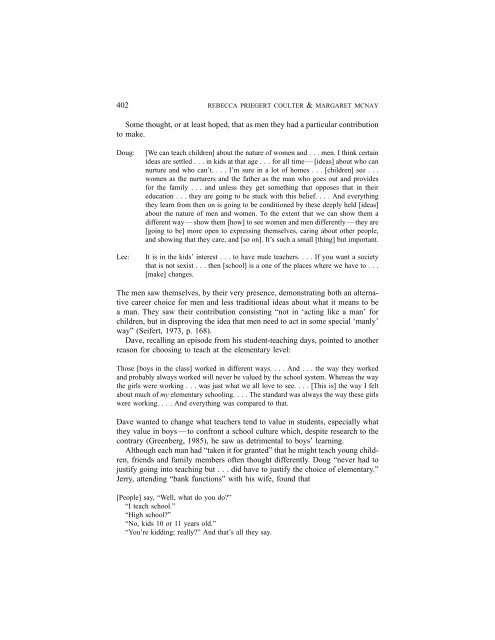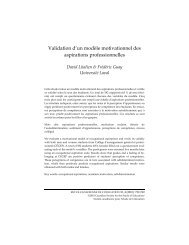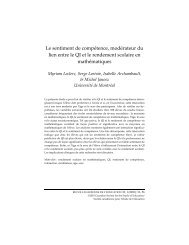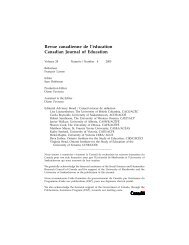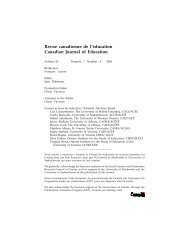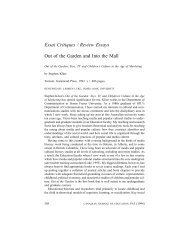Mireille Falardeau et Michel Loranger Le choix de stratégies ... - CSSE
Mireille Falardeau et Michel Loranger Le choix de stratégies ... - CSSE
Mireille Falardeau et Michel Loranger Le choix de stratégies ... - CSSE
Create successful ePaper yourself
Turn your PDF publications into a flip-book with our unique Google optimized e-Paper software.
402 REBECCA PRIEGERT COULTER & MARGARET MCNAY<br />
Some thought, or at least hoped, that as men they had a particular contribution<br />
to make.<br />
Doug: [We can teach children] about the nature of women and . . . men. I think certain<br />
i<strong>de</strong>as are s<strong>et</strong>tled . . . in kids at that age . . . for all time — [i<strong>de</strong>as] about who can<br />
nurture and who can’t. ...I’msure in a lot of homes . . . [children] see . . .<br />
women as the nurturers and the father as the man who goes out and provi<strong>de</strong>s<br />
for the family . . . and unless they g<strong>et</strong> som<strong>et</strong>hing that opposes that in their<br />
education . . . they are going to be stuck with this belief. ...An<strong>de</strong>verything<br />
they learn from then on is going to be conditioned by these <strong>de</strong>eply held [i<strong>de</strong>as]<br />
about the nature of men and women. To the extent that we can show them a<br />
different way — show them [how] to see women and men differently — they are<br />
[going to be] more open to expressing themselves, caring about other people,<br />
and showing that they care, and [so on]. It’s such a small [thing] but important.<br />
<strong>Le</strong>e: It is in the kids’ interest . . . to have male teachers. ...Ifyouwant a soci<strong>et</strong>y<br />
that is not sexist . . . then [school] is a one of the places where we have to . . .<br />
[make] changes.<br />
The men saw themselves, by their very presence, <strong>de</strong>monstrating both an alternative<br />
career choice for men and less traditional i<strong>de</strong>as about what it means to be<br />
a man. They saw their contribution consisting “not in ‘acting like a man’ for<br />
children, but in disproving the i<strong>de</strong>a that men need to act in some special ‘manly’<br />
way” (Seifert, 1973, p. 168).<br />
Dave, recalling an episo<strong>de</strong> from his stu<strong>de</strong>nt-teaching days, pointed to another<br />
reason for choosing to teach at the elementary level:<br />
Those [boys in the class] worked in different ways. ...And...thewaythey worked<br />
and probably always worked will never be valued by the school system. Whereas the way<br />
the girls were working . . . was just what we all love to see. ...[This is] the way I felt<br />
about much of my elementary schooling. ...Thestandard was always the way these girls<br />
were working. ...An<strong>de</strong>verything was compared to that.<br />
Dave wanted to change what teachers tend to value in stu<strong>de</strong>nts, especially what<br />
they value in boys — to confront a school culture which, <strong>de</strong>spite research to the<br />
contrary (Greenberg, 1985), he saw as d<strong>et</strong>rimental to boys’ learning.<br />
Although each man had “taken it for granted” that he might teach young children,<br />
friends and family members often thought differently. Doug “never had to<br />
justify going into teaching but . . . did have to justify the choice of elementary.”<br />
Jerry, attending “bank functions” with his wife, found that<br />
[People] say, “Well, what do you do?”<br />
“I teach school.”<br />
“High school?”<br />
“No, kids 10 or 11 years old.”<br />
“You’re kidding; really?” And that’s all they say.


